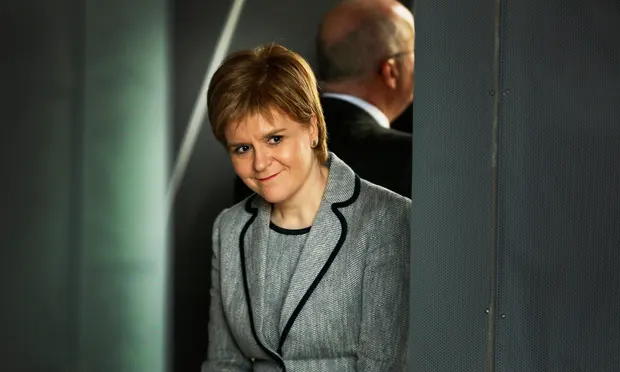The arrest of former first minister Nicola Sturgeon by Police Scotland investigating the funding and finances of the SNP is a sensational development that has sent shockwaves across the Scottish political establishment.
It follows a two-year inquiry by senior detectives at Police Scotland, assisted by officers from the National Crime Agency, into what’s become known as the “missing £600,000”.
This cash was raised by a crowdfunding effort by the SNP leadership, while she was party leader and first minister of Scotland, to pay for a campaign in an independence referendum. But the vote hasn’t taken place and the money is missing.
On Sunday, Sturgeon was being questioned in custody by detectives more than two months after her husband, Peter Murrell, was also arrested as a suspect.
Until Sunday, on the one occasion when she was asked about the police investigation, Sturgeon claimed that she had not been interviewed by the police. Police Scotland had never commented in any way on this claim.
Murrell had been the longstanding SNP chief executive until his resignation in March. His arrest came as squads of police carried out an exhaustive search of the couple’s home near Glasgow on April 5.
The intensity of their search, which included a forensic tent and large police van being parked in her front drive, led to complaints from the senior SNP officials and politicians that the police action had been a “grotesque circus”.
In what was seen as an angry response to such criticism, Police Scotland’s chief constable Sir Iain Livingstone delivered a stern hands-off message to the SNP – insisting that his officers would continue investigating without the distraction of political pressure from any direction.
However, the search of the Sturgeon address was speedily followed by officers seizing a £120,000 motorhome that had been parked in the driveway of the Fife home of Sturgeon’s mother-in-law.
As well as her husband being arrested, then freed pending further inquiries, the SNP’s treasurer Colin Beattie was also arrested and freed.
Those two, together with Sturgeon, had been the three signatories to the party’s annual accounts. And the fact that they had been arrested, while Sturgeon had not, had raised eyebrows throughout the Scottish legal and political establishment.
Almost exactly two years prior, Douglas Chapman MP – a former party treasurer – had tendered his resignation, complaining that he bad been prevented from seeing all the relevant papers concerning the missing funds.
Subsequently, a tape recording was obtained by a Scottish newspaper which revealed that at a meeting of the party’s ruling national executive, Ms Sturgeon had insisted to senior colleagues that all was well with her party’s accounts.
However, shortly after this meeting Police Scotland announced that it was investigating the “missing £600,000”.
This statement was followed by reports that investigators had sought advice and guidance from the National Crime Agency, which usually handles complex investigations.
Nicola Sturgeon resigned as first minster on Feb 15. She had served as party leader and head of the Scottish Government since she replaced Alex Salmond after the SNP’s defeat in the 2014 referendum on independence.
Announcing her departure, she said her tenure had been too long and that she had lost any right to privacy.
Three days after her husband had been arrested on April 5, Sturgeon gave an emotional interview to reporters.
Standing outside her home she said she understood the scrutiny but said “recent days have been difficult” but that there would be full cooperation with the police investigation. She added her husband’s arrest had been “traumatic” and her “worst nightmare”.
Her successor, Humza Yousaf, has tried to keep political life on an even keel. In that he has failed, as everyone believed that the only important issue was what had happened to that massive sum of money which had been donated by party members.
In an impromptu press conference on a stairway in the Scottish Parliament building, she told reporters: “I understand the view that some people might have, that I knew this was all about to unfold and that’s why I walked away. Nothing could be further from the truth.
“I could not have anticipated in my worst nightmares what would have unfolded over the past few weeks.”
After Sunday’s events, that seems an almost prophetic statement.



